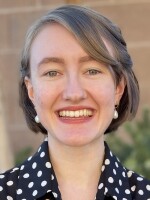Dr. Deborah Kuhls still vividly remembers the morning of October 2, 2017 — the day after the Route 91 shooting. After working all day October 1 and through the rest of the night as the calls started coming into the ER, she was ready to get home and sleep. Stepping outside of UMC’s Trauma Intensive Care Unit that morning, where she had served as the medical director for more than fifteen years, to talk to the assembled media, Kuhls was struck by what she saw across the street from the hospital. “There were all of these community members lined up, and there was this temporary blood donation center that was set up,” she says. “My recollection was, there were a thousand people there waiting to donate blood.” Driving home on West Charleston that same afternoon, Kuhls remembers experiencing a similar shock seeing a traffic jam of cars lined up, waiting to get into the city’s main donation center.
Although thousands of people waiting to donate blood would arrest most people’s attention, for Kuhls, a physician who has found renewed purpose in actionable steps to help her community since 1 October, this tangible gesture from Las Vegans was especially meaningful. “We saw the entire community really rise to the occasion,” she says. “A lot of lives were saved.”
Since the shooting, Kuhls has retired from her role as medical director of UMC’s Trauma Intensive Care Unit to focus on teaching the next generation of physicians at UNLV’s Kirk Kerkorian School of Medicine. “I have a tremendous appetite to be trained well and to train others in disaster management,” Kuhls told Desert Companion five years ago. And train others she has — since the fall of 2017, Kuhls has delivered 50 speeches about Route 91 and how other hospitals can respond if a similar event happens near them. And as the newly minted assistant dean of research at the medical school, Kuhls’ recent research has focused on similar themes to that of her public speaking engagements: She and other healthcare professionals from around the United States just published an academic paper on lessons learned from America’s six biggest mass shootings, including 1 October. Currently, she is conducting a national survey on gunshot wounds, which is slated to publish soon. “Sharing what we learned and what the experience was like (in order) to help others gave me a sense of satisfaction,” she says, reflecting on how she has used research to process the shooting. “I think for me personally, it must have been therapeutic.”
All this research is intended to help healthcare professionals respond when the next mass shooting happens — and there have been many more since October 1, 2017. Since COVID-19 cases have tapered off, Kuhls has noticed a return to pre-pandemic levels of gun violence. “Those of us who were sensitized to shooting, we realized that they stopped during COVID,” Kuhls recalls, “but once the really serious portion of the pandemic started to improve, the shooting started again. And the rapidity in which they are occurring is really alarming. Our society somehow has the need to express some feeling or dysfunction as violence. And that continues to be very, very alarming.”
In this landscape of continued shootings, Kuhls emphasizes the importance of remembering what happened in Las Vegas, even five years later. “The reflection has to be just recognizing the pain and suffering that happened, and in that, that pain and suffering can go on,” she says. Yet Kuhls has hope that her continued research and advocacy since then will help others in the future. “We’re optimistic that we can make progress, but it will take a lot of hard work, perseverance, and, I think, a lot of money to do that.” Φ










